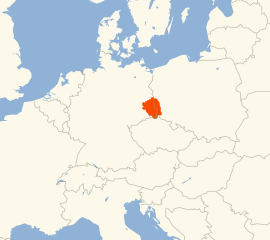Lausitz
|
Lusatia Lausitz, Łużyce, Łužica, Łužyca, Lužice |
||
|---|---|---|
|
||
 |
||
| Countries |
|
|
| Largest city | Cottbus/Chóśebuz | |
| Time zone | CET (UTC+1) | |
| • Summer (DST) | CEST (UTC+2) | |
Lusatia (German: Lausitz, Upper Sorbian: Łužica, Lower Sorbian: Łužyca, Polish: Łużyce, Czech: Lužice) is a region in Central Europe. The region is the home of the ethnic group of Lusatian Sorbs, a small Western Slavic nation. It stretches from the Bóbr and Kwisa rivers in the east to the Pulsnitz and Black Elster in the west, today located within the German states of Saxony and Brandenburg as well as in the Lower Silesian and Lubusz voivodeships of western Poland.
Historically, Lusatia belonged to several different countries. Being part of the Lands of the Bohemian Crown (the so-called Czech Lands) for three hundred years, alongside them it passed to the Habsburg Monarchy and from it to the Electorate of Saxony. The greater part passed to the Kingdom of Prussia in 1815 and the whole region merged into Germany in 1871. After the conquest of Eastern Germany by the Soviet Army and the partition in 1945, the eastern part of Lusatia along the Lusatian Neisse river was given to Poland where the boundary is called the Oder–Neisse line.
...
Wikipedia


